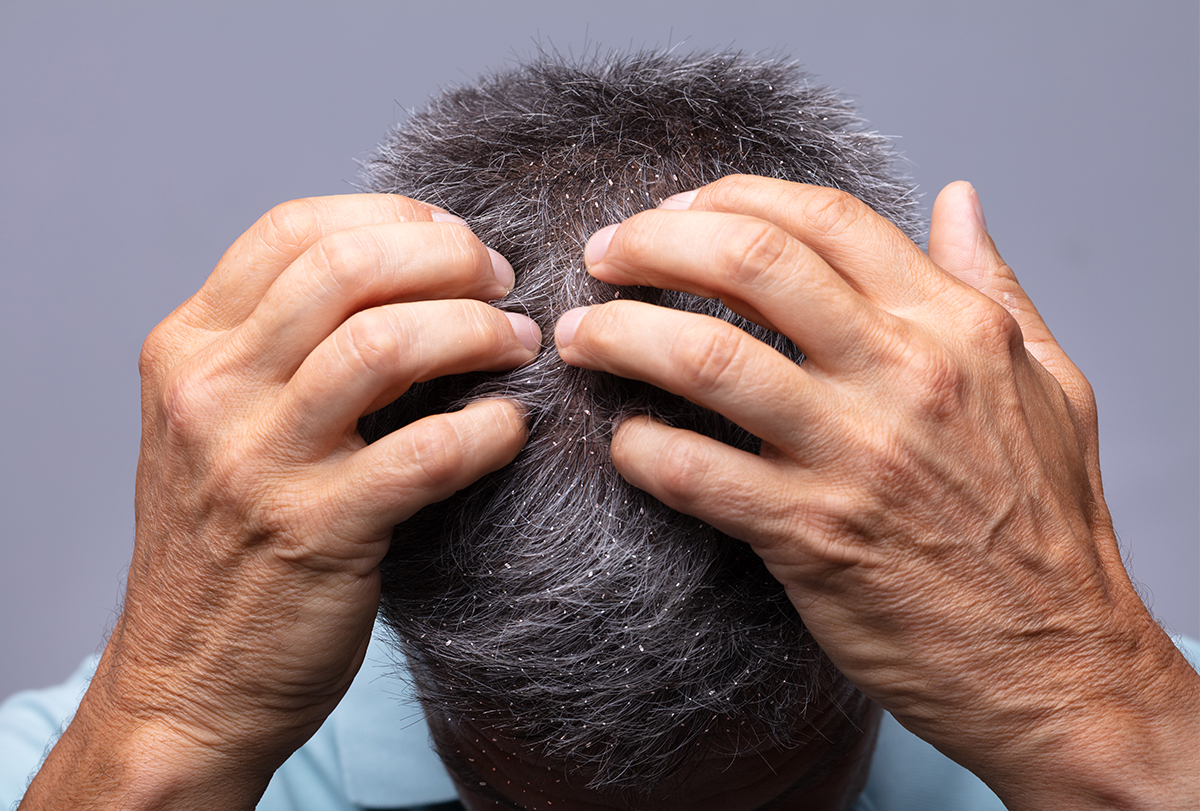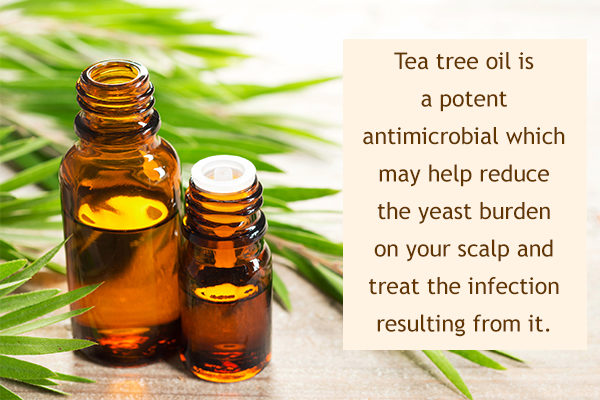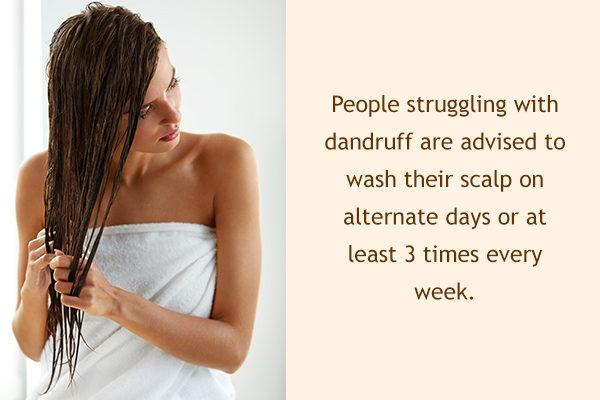In this article:
Dandruff is a mild form of seborrheic dermatitis characterized by dryness and flaking of the scalp. Seborrheic dermatitis is a chronic and common condition that is said to be on the same spectrum as psoriasis, only much milder.

The former condition affects the scalp and face and sometimes even the body, whereas the latter affects not only the skin (plaque, guttate, inverse psoriasis) and nails (lifting or pitting of the nail plate) but also the joints (psoriatic arthritis). (1)
Dandruff, however, is limited to the seborrheic regions of the scalp. Its severity can range from mild flaking to the development of intense redness, itching, and thick, scaly plaques. (2)
How Common Is Dandruff?
Seborrheic dermatitis is quite common, but its mildest form (dandruff) is even more common and probably affects up to 15%–20% of my patients. It affects men more than women and can be very prevalent in those who are immunocompromised (HIV/AIDS).
Seborrheic dermatitis can affect infants, but I see a lot of it in adults, especially those over age 50. My elderly male patients commonly have seborrheic dermatitis affecting the scalp, ears, and face (inner eyebrows, around the nose, sideburns). (2)
Different Types of Dandruff
The spectrum of seborrheic dermatitis ranges from dryness without redness with light flaking to redness, flaking, and itching. (3)
At its worst, thick raised plaques of silvery scale develop that is adherent to the scalp and its hair shafts, causing intense itching. (3) At times, the pruritus (itch) is so intense that patients lose hair from the constant inflammation and scratching.
Seborrheic dermatitis can progress from the scalp down to the ears, eyebrows, around the nose, chin, “V of the neck,” armpits, and groin.
Causes of Dandruff
Dandruff is thought to be related to the yeast Malassezia. This yeast is a commensal microbe that lives on the skin from infancy and can cause “cradle cap” in babies.
The same yeast can cause inflammation of the scalp, face, and body in adults presenting as seborrheic dermatitis. Some sources think that eczema or a compromised skin barrier may be related to seborrheic dermatitis. (4)
Most Effective Ways to Control Dandruff
I will evaluate the severity of the scalp condition and itch of the patient. I then will recommend a combination of over-the-counter shampoos (tar or salicylic acid shampoos) and prescribe anti-yeast shampoos (ketoconazole, ciclopirox).
If there is a significant itch, I will then recommend a topical steroid (available as a solution, foam, spray, or oil).
If the scale is very thick and adherent to the hair shafts, I will prescribe the topical steroid as an oil, but in the majority of cases, I will prescribe steroid drops to apply to a wet scalp and massage the medication into the itchy areas of the scalp.
Best Essential Oils for Dandruff Control

A variety of oils may help with dry flaking of the scalp, including something as simple as mineral oil. To treat a yeast infection, tea tree oil can be considered as it is antimicrobial and can decrease the yeast burden on the scalp.
For inflammation presenting as itching and redness, I prescribe a topical steroid oil that you would apply at bedtime under a shower cap and wash off in the morning. (3) This soothing oil can be effective at treating inflammation while also breaking up thick plaques and scales on the scalp. (3)
How Long Does It Take to Get Rid of Dandruff?
When treating seborrheic dermatitis of the scalp, stay consistent with the prescribed topical medications (shampoos, topical steroids), and you can then expect improvement in the redness, itching, and flaking in 3–6 weeks of use.
Again, seborrheic dermatitis is a chronic condition, and there is no cure. The goal is to keep the “volume down low” and to prevent significant flare-ups.
Dandruff Flare-Ups During Winter
It can be argued that seborrheic dermatitis and eczema are interconnected. Eczema worsens in the winter as the cold winter air pulls moisture from the skin to replace the lost water that is turned into condensation outside.
Also, indoor air is dehumidified when you turn your heater on all night while you sleep. These factors can dry out your scalp and can increase the flaking and scaling.
Can a Hot Bath Cause an Increase in Dandruff?
Malassezia yeast thrives in hot and humid environments and can cause a body rash that can discolor the skin called tinea versicolor.
With this in mind, a prolonged hot shower can cause issues in a multi-factorial way:
- It may create a warm and moist environment that is conducive to Malassezia proliferation on your scalp.
- Hot water can cause damage to the epidermis and thus can worsen eczema.
- Heat can cause dilation of blood vessels and can increase redness and itch.
Is It Possible to Get Rid of Dandruff Permanently?
Seborrheic dermatitis is a chronic condition that has no cure. It will flare up intermittently, especially with changes in the weather (cold and hot weather) and stress/emotional anxiety.
Hair Washing Guidelines to Manage Dandruff

In the case of worsening dandruff or a flare-up of seborrheic dermatitis, your scalp may be telling you that it is time to wash your hair and clear out the overload of the resident yeast Malassezia.
It is recommended to wash the scalp at least three times per week or every other day for those with dandruff, but during a flare-up, you may need to wash the scalp with medicated shampoos daily until the condition subsides.
Overwashing your hair by cleansing more than once a day is not recommended, as this can significantly dry out your scalp and worsen the underlying eczema. Skin care is all about balance, patience, and consistency.
Hair Products That Can Worsen Dandruff
Avoid harsh products that cause further irritation of the scalp.
Allergic contact dermatitis of the scalp can present as a bright-red rash along the hairline that extends into the rest of the scalp. I have seen this in multiple cases that sometimes require oral steroids/prednisone.
Also, avoid products that cause any form of pain, stinging, burning, or increased redness. With eczema, the skin barrier is compromised and can thus be susceptible to bacteria and allergens/irritants that can worsen scalp dermatitis.
Precautions to Be Taken When Dealing With Dandruff

Remember that dandruff and seborrheic dermatitis are chronic conditions. If left untreated, it can cause intense redness, itch, and flaking as well as hair loss from frequent scratching and inflammation.
The goal is not to cure the condition but to mitigate flare-ups and to minimize the symptoms, especially during times of stress or other triggers (such as weather changes).
- Over-the-counter shampoos may help, including those containing zinc pyrithione, selenium sulfide, tar, salicylic acid, and tea tree oil.
- I prefer tar-containing shampoo for intense inflammation/redness and itch, while I recommend salicylic acid-containing shampoo for flaking without redness. Pregnant women are strictly advised to consult their physician before starting any over-the-counter shampoo.
- If your scalp condition is not well controlled with over-the-counter shampoos, please consult a dermatologist for prescription medications. While waiting for your appointment to see a dermatologist, stop all irritating hair products (such as hairspray with harsh chemicals), avoid hot scalding showers, and refrain from constant scratching.
- Also, you may need to increase the frequency of cleansing your scalp to clear the yeast Malassezia. When you are prescribed a topical steroid for your scalp, do not use the medication on your face without guidance from your dermatologist as topical steroids can cause thinning of the skin if used improperly.
Medical Conditions Related to Dandruff
Multiple conditions can either cause resistant cases of seborrheic dermatitis, including HIV/AIDS and Parkinson’s disease, or coexist with seborrheic dermatitis, such as eczema, psoriasis, acne, and rosacea. (2)
Sometimes, the treatment for facial seborrheic dermatitis will overlap with rosacea treatment, including sodium sulfacetamide with sulfur cleansers or emollient creams.
Can Stress Aggravate Dandruff?
Nearly all skin conditions worsen with stress, and dandruff is no exception. (5) The mind and skin are closely connected, and when you are stressed with work, family issues, finances, and legal conflicts or you are grieving a death or an illness, dandruff, and seborrheic dermatitis tend to flare up. These conditions can even become resistant to treatment in such cases.
Final Word
Dandruff is a common problem that does not cause any major harm but can be extremely discomforting and can reflect poorly on your hygiene. That said, dandruff is not necessarily associated with a lack of cleanliness but can be aggravated by it.
Dandruff is mostly the result of skin dryness and inflammation brought on by various factors such as cold weather, wrong hair care products, and overgrowth of a commensal fungal species Malassezia on the scalp. Many anti-dandruff shampoos are commercially available, but you can consult your doctor about the most suitable option for your case.
If the condition is severe, the doctor may prescribe a stronger medicated shampoo along with other topical steroids to manage the skin inflammation. You will have to follow the doctor-recommended guidelines for scalp hygiene to keep dandruff under control.
If left untreated, the condition can become unbearably itchy, and the constant scratching can give rise to rashes and secondary scalp infections.
- Was this article helpful?
- YES, THANKS!NOT REALLY


